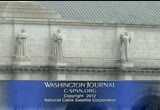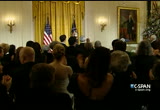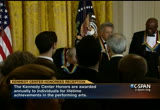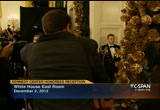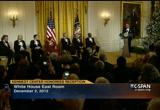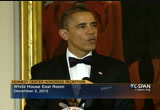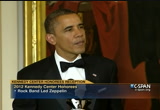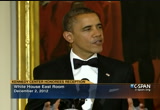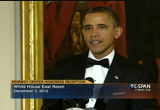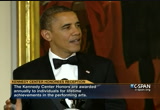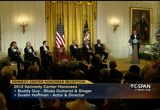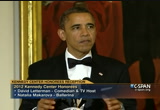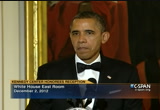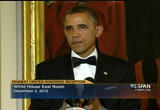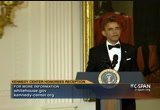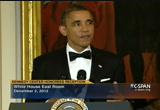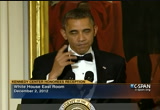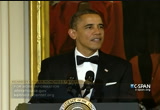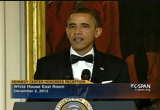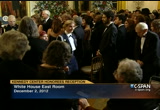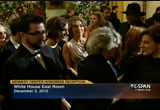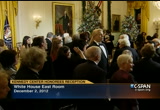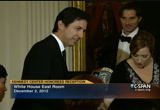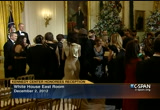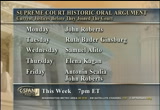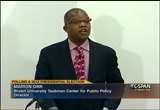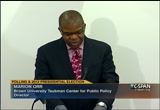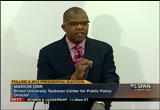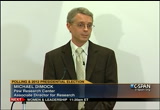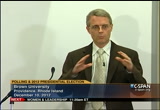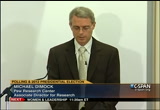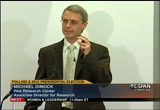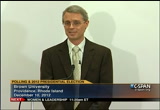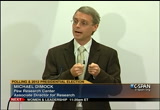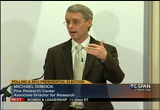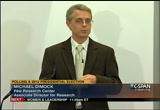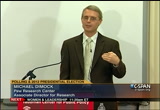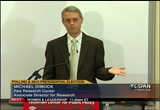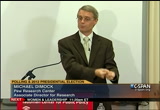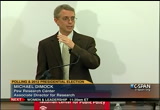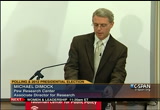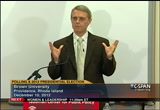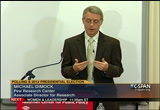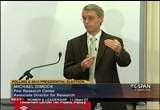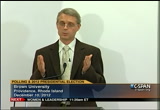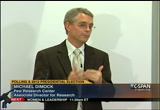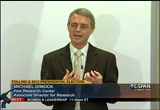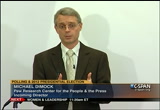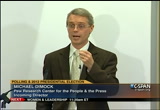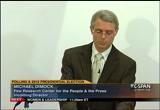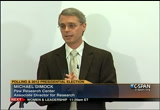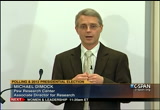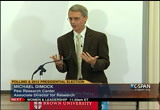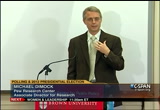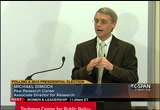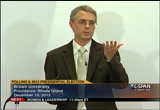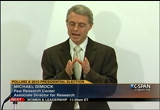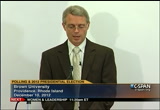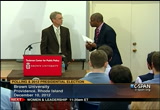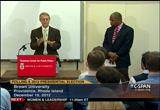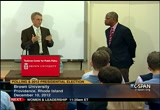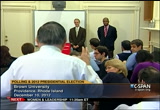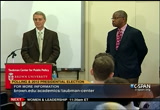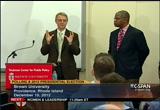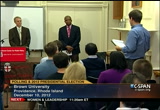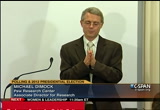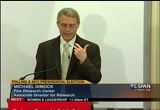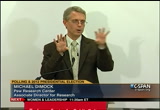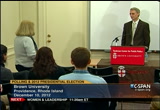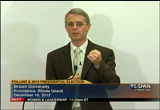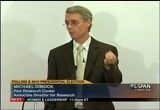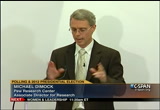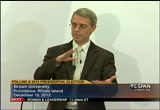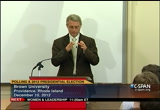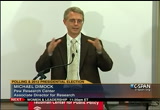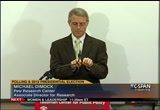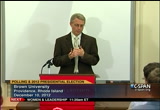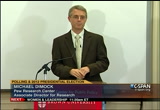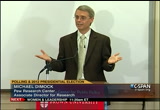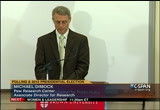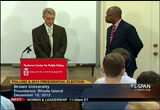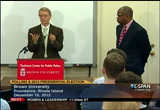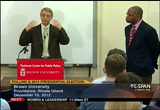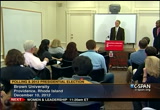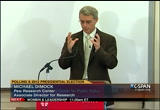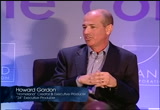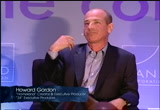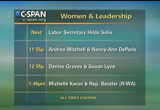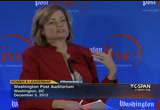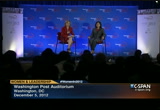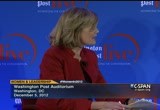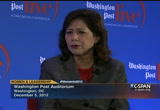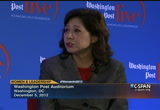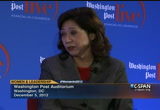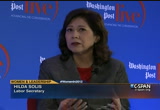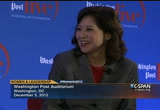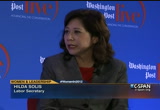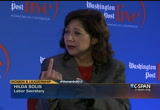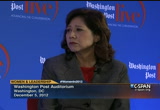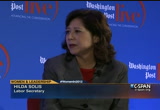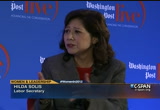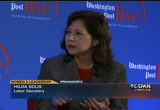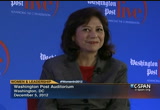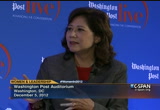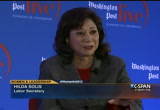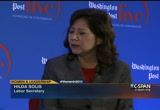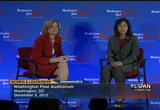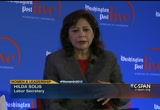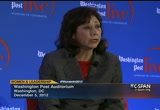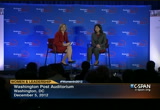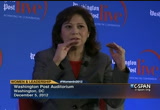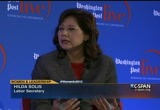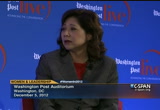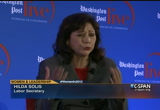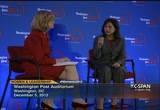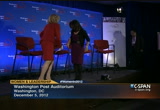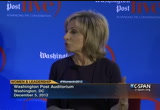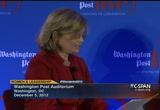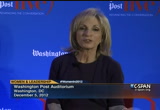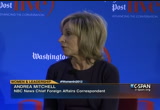tv Politics Public Policy Today CSPAN December 24, 2012 10:00am-12:00pm EST
10:00 am
>> here is our lineup of programs on c-span -- up next, president obama with the kennedy center honorees at the white house. after that, pulling in the presidential election. then, an event about women in leadership. >> next, a tribute to this year's kennedy center honorees at the white house reception. individual awards are given to individuals for their lifetime achievement in performing arts. this year, best of hoffman and david letterman. -- dustin hoffman and david
10:01 am
10:02 am
10:03 am
>> hello. hello. thank you. thank you. thank you so much. thank you. thank you. thank you. great. everybody please have a seat. thank you. good evening, everybody. you all look lovely. welcome to the white house on a night when i am no where close to being the main attraction. thank you, david rubenstein, michael kaiser, and the kennedy center trusties and everyone who
10:04 am
has worked so hard to hold president kennedy's commitment to supporting the arts. i also want to recognize another one of president kennedy's amazing legacy, and that is his wonderful daughter, caroline, who is here tonight. [applause] none of this would be possible without the co-chairs of the president's committee on arts and humanities, george stevens. there he is. [applause] and his son, michael. where did michael go? there he is. they have produced the kennedy center honors for 35 years now. tonight we continue a tradition of the white house by honoring extraordinary people who have no business being on the same stage together. [laughter] uy sitting nextot
10:05 am
dustin hoffman. all three living members of led zeppelin in one place. so this is a remarkable evening and speaks to something that has always made this country great, the idea that here in america, more than any other place on earth, we are free to follow passions, explore our own gifts and people from all over the world come here to make sure that they, too, can be provided this incredible gift. tonight honoree's did not take up the craft to make a living, but they did it because they could not imagine living in the other way. that passion took each of them from humble beginnings to the
10:06 am
pinnacle of their profession. tonight in the people's house we have a chance to say thank you. grow way up as the sun of a sharecropper in louisiana, buddy guy made his first guitar out of wires from a window screen. that work and tell his parents started wondering how the miskitos were getting in. he was hooked. a few years later he will reject bought a one-way ticket to chicago to find his heroes, muddy waters. pretty soon he was broke, hungry, and ready to head home. one night a man pulled up and handed him a salami sandwich and said i am mud, and you ain't going nowhere. that was the start of success. he has not changed. he tells a story about his son
10:07 am
wanted to learn to play the guitar like prints. buddy told him he'd better learn jimi hendrix first. it was only after washing -- watching a tv special that he found that jimmy had borrowed some licks from his dad. he said i did not know you could play like that. but he said you never asked. today buddy is still going strong, one of the last guardians of the great american blues. i will never forget him fleeing sweet home chicago in this very room back in february and him and a few others forcing me to play along, which was just ok. there are not too many people who can get me to sing, but buddy was one of them so we are so glad we can honor him tonight. congratulations. [applause]
10:08 am
when the graduate was originally written, the main character was supposed to be robert redford, tall, blond track star. when dustin hoffman auditioned for the part, a crew member handed him a somewhat token -- subway token and said you are going to need this. [laughter] [applause] dustin ended up getting the role in launched a great career role. most actors dream of being in the movie that becomes part of our vocabulary. not bad for a guy who signed up for his first acting class after told him a one flunks acting, it
10:09 am
is like jim mudd. [laughter] -- it is like gym. i imagine his success is the inability to see himself anything other than an underdog. he said i really believe that was a fluke and refuse to believe i have arrived. in a way, i've been hanging on by my fingertips for the entire ride here yet you will be glad to know that this award was not supposed to go to robert redford. here has one. [laughter] -- he already has one. dustinght we honored tu hoffman, who has finally arrived. [applause] if you ask david letterman what is it like to tape a show, he
10:10 am
says it is going well, it just which you. it is not going well, it things you. my favorite hour of the day. it is unclear how he feels about this hour. it is different when you're not the one with the microphone. isn't it? you're looking a little stressed, aren't you? i would also point out it is a lot warmer than on dave's set. i have enjoyed my time in "the ed sullivan theater." he it celebrated 30 years, the only person to reach that milestone besides johnny carson. he will be the first to tell you he is no person and all the years on television have only made him appreciate how you meet johnny was, but that is a good thing, because if he were more like johnny, he would be less
10:11 am
like david. it was david duke got his start as an indianapolis weatherman was reported the city was being pelted by hailed the size of canned hams. [laughter] one of the highlights of his career. it was dave bootstrapped a camera to a monkey, worked a talk about drive-through, told lady gaga when he was her age he had a paper route. it was dave who came back on the air less than a week after 9/11 to show the world the work was still standing. [applause] tonight we honor dave letterman who has always offered as an authentic piece of himself.
10:12 am
sometimes cranky, often self- deprecating, always funny. those of you who have been on the show he is also a true gentleman. thank you. [applause] when natalia the affected from the soviet union in 1970 she made headlines around the globe, but back home her name was excised from textbooks, photographs expunge from the school and her countrymen work -- were forced to rely on underground channels. no one can be raised what takes hold of the heart. in 1989 when the iron curtain opened, the welcome people -- russian people will come to her back with open arms. 2000 people packed the theater
10:13 am
where she trained as a young girl. another 20 people crammed in with the orchestra all to watch the dancer we never thought she would be back. she possessed an incredible gift for musicality and movement told her parents she did not want to be an engineer. she wanted to dance. after hanging up her shoes, she moved to broadway -- broadway where she won a tony award in remains as humble as ever. once the i am never proud of what i've done, sometimes i am not ashamed. thank you for the understatement of the century. thank you for sharing your talents with all of us. congratulations. [applause]
10:14 am
i worked with a speechwriter and there is no smooth transition to led zeppelin. we're trying to work a stairway to heaven metaphor, and it did not work. when jimmy page and john paul jones and john bob burst onto the musical screen, the world never saw it coming. there was a singer with the me like a lion, a voice like a being she, guitar prodigy who let people's jobs on the floor, equally at home on the keyboards. a drummer who played the dislike depended on it. when they initially kept their distance, led supplicant proud america from opening court. we were ready for what should be called songs with a lot of light and shade.
10:15 am
it has been set a generation of young people to buy teenage aids with a pair of headphones and is up when album and the generation of parents wondered what all that noise was about. even now, 32 years after his passing we all appreciate the fact that this that led legacy lives on. the last time the band performed together in 2007, perhaps the last time ever, more than 20 million fans applied for tickets. what they saw were no frills and theatrics, a few guys that could still make ladies we get these huddled together, following the music. these guys redefine the rock and roll lifestyle. we do not have video of this. and [laughter] but there were some hotel rooms trashed and a ham all around.
10:16 am
it is fitting we're doing this in a room with windows that are 3 inches thick. and secret service all around. the guys, settle down. anthey look very calm now. it is a tribute to you guys. tonight we honor of led zeppelin for making of all feel young and showing us that some guys that are not completely youthful are still there. we have david letterman, buddy guy, led zeppelin. each -- [applause]
10:17 am
each of us can remember a moment when the people on the stage touched our lives. maybe they did not lead us to become performance ourselves, but maybe they inspired us to see things in any way, to discover something within the us or appreciate how much beauty there is in the world. it is the unique power that makes the parts so important. you may not always think about the importance of music or dance or life of the nation, but who would want to imagine an america without it? that is why we celebrate artists like the ones here tonight. that is why in the season of joy and thanksgiving, they have earned our deepest appreciation. congratulations again to tonight's honorees. thank you all very much. i look forward to a spectacular evening. thank you.
10:18 am
10:23 am
>> the issue is not whether they will be stigmatized or morally condemned. we know the answer, he is. the issue is how many different times the government, of the moral condemnation. the answer in the double jeopardy clause it wants. >> starting monday, c-span is featuring supreme court's oral arguments before the war on the bench. all this week it 7:00 eastern time. listen in the baltimore area. for online c-span.org.
10:24 am
>> brown university held the discussion about polls were saying before and after the 2012 presidential election. the associate research director explained. he also talked about the future of presidential polling. this is an hour. >> good afternoon, everyone i and the professor of public policy and director here at brown university. i am happy to welcome you to another installment of the speaker series. the luncheon speaker series is one of the of any event. it attempts to inform brown and a larger community about
10:25 am
important matters related to government, politics, and public policy. over the years the speaker series has been a wonderful opportunity for the undergraduate students and masters did it a public policy to connect with of foreign- policy thinkers. we're just pleased this afternoon to welcome the associate director for research of the ku research center. michael has co-authored a number of the pure research center landmark thoughts including in- that of political -- political and social values. next month michael will be promoted. he has a promotion. he will be the director of the pew research center for the people in the press to survey.
10:26 am
pew, he wasng few up political science director at north carolina. he received his ph.d. from the university of california san diego. he was part of a team of analysts who correctly predicted the outcome of the popular vote to in this year's presidential election between mitt romney and president obama. today he will give us an overview of the events and values that shaped the 2012 election, while giving us an inside look at the challenges and choices, public opinion it researchers face and pre- election polls. please join me in welcoming him to the taubman center.
10:27 am
[applause] >> thank you. it is always a pleasure. always a fun time to talk about what we find in the polls, and the polling process after an election. this is a time where us in the business think a lot about what is going on and how effective pulled far at capturing public feelings. certainly we all have our feelings crossed -- fingers crossed going into election be e outcome. i thought i would start by talking about the election and what i thought the challenges were that they would face and how it played out over the course of that from our perspective, as well as what i think the exit polls said about voters in minnesota on election day. then turn it over to a little more of the discussion that can
10:28 am
include discussions about the polling process, how things are going and changes are happening in the industry and what that means for public opinion moving forward. the way i think about the election poll going into the cycle is to try to formulate with the key questions are that each candidate faces. what are the challenges that each of the canada has to overcome, or the key hurdles they have to overcome in order to be victorious? overall, i think there were three challenges for mitt romney. one was a rallying his political base after a very fractious cry very. the second was over coming of personal image problem he had that he was viewed unfavorably by a lot of people and had to
10:29 am
change that if he was would be successful. third, he have the challenge of being saddled with a very unpopular brands. the republican party image going into the election was negative and some measures. so he had those three fundamental headwinds as he came into the general election cycle that he was glad to have to deal with. i think for obama, there were also three challenges. one parallel to mitt romney rallying his face, he had to rally the liberal base as well. there were concerns that liberals were a little disenchanted or let down by the progress or lack of progress they thought had been made over his first term and whether the liberals were back had enthusiastically. he had to mobilize key groups that helped him in 2008 but are
10:30 am
not necessarily traditionally strong turnout sekhmet, for too early young voters and minority voters. i think most people thought and we certainly thought getting that level of engagement, if not equal to 2008, at least more than the historical norm would be critical to him. a third one is the economy. and, it will some extent be held accountable for economic circles the of this. he was facing continued on of one of levels nationwide and a lot of public discouragement about the improvement of the economy. the hurdle for him was trying to not get taken down by that problem as previous incumbents often have been. one thing that is absent in some respects to the conversation about the challenge is what political scientists may refer to as a gender gap.
10:31 am
a big part of the discussion is who could set the issue that the campaign can be fought over? who would determine who the -- for the battlefield would be? use of that play a big role in a lot of previous election cycles. famously in 1992. they wanted to make sure that was an election framed around the the back of -- around economic circumstances. in 2004 when george w. bush was running for reelection, he wanted the election to be more about security and social issues. other republicans made a big push to talk about gay marriage, because it was an issue that potentially worked to their benefits at that point. instead of a focus on the economy, which john kerry was
10:32 am
eager to talk about. this year he did not see as much of that, because i think the battlefield was pretty much set for the campaign. this country -- this is going to be an election about the size and scope of government. the role government should play an economic recovery, about the fundamental question that has been divided democrats and republicans for decades, but really has become so much more crystallize across a wider scope of issues. i think both sides were glad to have to find out the election on that court issue. i think both sides felt they could win on the issue. republicans in the mitt romney campaign took a lesson from 2010 that there was an anti- government viewed in america. they could win on the battlefield. i think obama's team also felt it was the more subtle story than just disliking government
10:33 am
and wanted less government, there are things the public still wants the government to do, and ultimately was the debate not just about bigger and smaller government, but the debate about fairness. i think they were able to take the same issue and focus on different elements about the fairness of the way government operates of the fairness of the economic system that worked to their benefit. i will come back to that towards the end. to think about these different challenges that the candidates based, talking first about it romney's campaign challenges. one was rallying the base. most of us observing the campaign fell by the time he had shown up for the nomination, there was a lot of question about whether the republican base would rally behind him. a lot of people who were not enthusiastic about him at all. not only in the elite levels, pundits and rush limbaugh-types
10:34 am
that said they would not to touch the support him even if the were the nominee, but also even in the general public. the polling in march and april showed not a lot of excitement about mitt romney all the that we being the nominee. not there with any -- not that there was an the other clear candidates all preferred, but that he was met with a lot of lukewarm support. what we saw an hour poles, and most polls would conform to this, that once he became the nominee, that rally happen fairly quickly. we found most of the core republican voting blocs, whether it is folks that identify with the party, white evangelical voters, whether it is just a general conservative group, a business group and so forth, the rallying happened fairly
10:35 am
quickly. i think it is a testament to how much these groups dislike barack obama. you could sort of predict that would happen and a lot of people did predict that. that rally came across fairly quickly. there is not a lot of evidence through the course of the fall or into the exit polls that there were any real resistance or lack of enthusiasm among some of the core conservative groups. one question and the together was whether his religion might be an issue for evangelical voters. we know even jokers -- evangelicals have a little bit of discomfort in the faith and what it is. we did some polling last november that suggested that while they may have some misgivings about the mormon faith, it was not going to be enough to sway them from voting
10:36 am
for obama. and the level of enthusiasm was relatively strong, even all the way into the final weeks of the campaign. it was not a lot of evidence that was a problem for them. i think the broader concern at related to the primaries and it from these past experience was that he had a favorability problem. he just was not an appealing candidates. not in terms of firing up the ideological base but appealing to the average american. by august his favorability ratings were still deeply negative territory. he had 37 percent of voters viewing him favorably. that is a -15 margin. we have never seen a presidential candidates be that-
10:37 am
that late in an election cycle. you could go through the previous candidates whether it is bob dole who lost by a wide margin in 1996, john kerry, john mccain @ -- none of them was in negative territory. all of them few them more favorably than unfavorably. this was something we have not seen before. part of that reflects the greater polarization of american politics right now. it used to be the case that a lot of voters from the other side would still like the other guy. even in 2008, a lot of democrats like john mccain, thought he was an ok guy. now i think we're in a time of greater partisanship and some respect so that his ratings were much lower on long obama supporters and democrats in general than is typical for that kind of cross party opposition. the bigger issue was among
10:38 am
independent voters, among the middle of the electorate. you would suggest an unappealing candidate. it was not just that they were not excited about him, they actively did not like him. most of the time when people have to cook a coin, they will say using ok. that was a big problem for him. some people would say it took him longer to tackle the issue over the summer than was ideal. that may have been a reflection of the obama campaign efforts in the early part of the summer to continue to cast him in a negative light. hasted advertisements very early showing class issues and his wealth. whether that was a big issue is hard to know. i do not think the mitt romney campaign did a lot to tackle the issue early on. i think some of its was
10:39 am
traveling overseas and talking about the olympics and things that did not do a lot to overcome some of the questions or doubts that people have. now his favorability ratings did improve after the convention. even at his best he was breaking even on favorability. no previous candidates has dealt with. the exit polls, 47 percent viewed him favorably. the evidence suggests it may well have been first candidates to go all the way to election day without ever turning those numbers fundamentally around. talking a little bit about obama's challenges and then coming back to mitt romney. one was rallying the liberals. with -- were they going to be
10:40 am
disenchanted with the progress and not get fired up for the obama campaign? we've been tracking that through his first term. the end of 2009 people were wondering whether liberals were getting disenchanted with president obama. he was not winding down of course. he did not close guantanamo. he did not stand up to the republicans to end the bush era tax cuts as he had promised he would in 2008. there were a lot of reasons for liberals to feel disappointed with the lack of progress on those issues, but we never really saw that in the polling. we would ask liberals how they felt, and we would get strong support almost all the time. one time we even try to go further. we said to you have a favorable or unfavorable oppression of obama? all the democrats with a favorable. -- would say favorable. can you think of anything obama has done that you are
10:41 am
disappointed with? he really had a level of support of the base that was very solid. that is not to say there were not disappointments, but to the extent they existed, once the republican primary process got started and really got raging, if there were any doubts among liberal democrats, why they wanted obama to win, the conversation that occurred during the republican primary broker out the base as to why this was a political election. .he fact that it wrongl we did not see any real evidence of any falloff. in the exit poll 25 percent call themselves liberal. it was 22% four years ago.
10:42 am
if anything, there is a sense that not this country has moved and the liberal of correction, the liberal base has consistently show that for him in 2012. the second question that is related, but not this thing, mobilizing the key groups. that was really a doubtful proposition going into the summer and even coming out of the convention. the poll we did in september, a very large sample size to study smaller subgroups was finding some pretty discouraging numbers for obama in terms of engagement on long you've been -- and voters and latino voters. the african-american voters were there. the intensity of support for obama really had not faded. the signs were there very early that the black vote would be there for obama, not just in terms of supporting him, but getting out to the polls.
10:43 am
the younger voters were looking very disengaged. the conventions did not get them and fired. i do not know that there were targeted. but we were not seeing the evidence we saw in 2008 of a really fired up youth vote that was enthusiastic about getting out there and boating. as you all know, that -- they ended up coming through. probably the biggest story of election night was the composition of the electorate. for myself, as an analyst, looking at the numbers, and most of the commentary coming out, if there was one surprise finding, it was the composition of the electorate. you have 19 percent of the electorate between the ages of 18-29, the same if not a point higher than four years ago. 14 percent african-americans. 10 percent latino. that was a point higher.
10:44 am
in all of those respects, the sense was that those key groups ended up showing up for obama. some of that could be attributable to a successful campaign and mobilization effort. they put a lot of thought in getting people to the polls. i do think at the end of the day we are seeing different in amex than we used to see. -- different dynamic than we used to see. one of the big observations is this is a sign of the future. it used to be the disparity were wide. those disparities narrowed in 2008, and a lot of people thought that of a one-time deal. it happened again. now the flu looks more like a pattern. everyone is wondering whether those fundamental assumptions
10:45 am
may be shifting. obama is a unique candidates. he is of minority candidates. it could be if and when that is no longer the case, we could see something. my sense is if it is not just about the skin color. it is about a new way of thinking. i think it is about a level of the engagement. to be honest, i think the efforts by some to move on issues that could be perceived as disenfranchising people, the movement by some in the republican party to try to tighten registration laws or tightened voter i.d. laws, they may have as much of a backlash as a fax for them. -- as defects for them. to some extent i wonder if that is a part of what we're seeing. i do not want to try the whole
10:46 am
republican party with this strategy, but for those pursuing this, they may be causing as much harm as good to them. turning to the economy. even with all of the fundamentals, getting liberals out and young people out, this is about the economy. 77 percent of the voters that the economy was in not so good or poor shape. only 25 percent said they felt they were doing better than they were four years ago. those are disastrous numbers. a lot of folks say year out from the election fell to he was going to have to make much more substantial progress, not only on fundamental economic efforts, but those public opinion numbers. as you saw late in the day, there were some improvement in unemployment numbers, but the fundamental public mood had not
10:47 am
changed all the way into election day. but they did not completely hold obama accountable for that period that ended up being the critical factor for him. i said 77 percent of the economy was in not so good or poor shape. most of those folks that not so good. the people who rated the economy as not so good voted for obama by about a 15 point margin. these are people who do not think the economy is doing well, yet they stayed with the incumbent. the same was true on a personal level. people who said their personal financial situation was no better or worse, same as it was four years ago, voted for obama. there was a sense that the people in the middle, the people who were not enthusiastic, they did not think it was a disaster ended up staying with the incumbent, which is remarkable.
10:48 am
i think it reflects some of the problems that it wrongly based in terms of building confidence. some of the fundamental problems were they're going into the election and were their coming out. there is one example that exemplifies problem. the as to is more to blame for the economic problems. 53 percent said george w. bush was to be waived. the damage the republican party has taken over the past six- eight years is still resonating with the american public. i think obama was able to get four years of about the economy and still get reelected because of the position the republicans are in. that brings me to the final concern, which was overcoming the negative image. one of the fundamentals of a new
10:49 am
election for a challenger to an incumbent is this is their opportunity to redefine what the party stands for. the republican party have leaders in congress, but then you can it it will become the defining figure of the political party and has the potential to change the image of the political party in a more positive way. there are clear examples of this. the most recent one is george w. bush in the 2000 election that really redefine his political party. talk about it passionate conservatism. he really came out of the gate early in 2000 to try to cast his party in a new life. arguably he lost on the margins but ended up becoming president regardless. bill clinton did the same thing in 1992. the democratic party had a very negative image for the same reason. doing a poor job in terms of
10:50 am
congressional leadership, which did very poorly, but then he cast a new image for the democratic party of what it represented and what it could be. that was the challenge coming into the election. the brand was so negative among folks in the middle and independent voters that somehow you need to craft a reason for people to trust republicans again, to give them the keys to the kingdom. i am not sure he ever successfully did that. i think the first presidential debate with the moment where it started. i think it was a bit late in the cycle 2 start rethinking their yen-- to start rethinking. the parties favorability is still much worse than the democrats. people see the republican party pretty negatively. even a fair number of republican-leaning voters do. i think the fundamental evidence is what people identify
10:51 am
themselves as. for those of you who follow the polling, one of the big debates was people saying there cannot be as many democrats voting this year as there were four years ago, that is impossible. it turned out to be the case. 38 percent called them democrats. 32 percent call themselves republicans. that is the same margin it was four years ago. even though mitt romney was able to win the independent voter, he won the votes of those who call them independent. that is not enough to overcome party identification, which is a testament to how poorly his party is viewed it right now. people are not willing -- even if they have policies in which they agree with the party, they're not willing to call themselves republicans. this is a fundamental problem the party faces right now let me
10:52 am
wrap up with a couple broader thoughts. all of this gets to a baseline issue of challengers taking on incumbents, which is you are asking the public to change forces. you are asking them to shift the leadership of the country. this could be a harder proposition that some people might think it would be. i think the mayor on the campaign at the end of the day probably underestimated that factor in this election. this economy was terrible, but that did not mean it was fun to be easy for voters to say the economy is terrible, what someone else in charge. one of the things of campaign advisers is to have to make a case not to fire the incumbent, but why your guy should be hired in his place. it is not clear the campaign made the second part of the deal romney wrongly -- mirtt
10:53 am
could do a better job. and at the polls when they asked to could do a better job fixing the economy, 48-47. there was never a point where the republican party or mitt romney was seen as better on an issue that had been a negative for four straight years. another aspect that is important is the anti-government mood has been over red -- read by a lot of observers. many republicans look at what happened and the midterm and assumed that was the model for 2012, more so than 2008. i think that was of fundamental misreading of what the midterm really meant. there were a lot of reasons republicans did very well. some of them were structural. some of them had the enormous congressional years.
10:54 am
2006-2008. the largest partisan turnover congress have seen in decades, which means there was a lot of exposed democrats that probably were holding seats that were very marginal and potential republican pickups. even a modest field for the sentiment could lead to a much broader turnover. we did see that take place in 2010. the other thing is the turnout differential between conservatives and liberals and 2010 was one of the speeches we have seen that 2010 that really was an election that fired up the republican debate, and democrats and some of the key groups we have been talking about did not really show up. you had a very extreme turn out differential that really helped to make it a sweeping victory for republicans and 2010. to think that those were for to carry over to a general election with the turnout will
10:55 am
be twice as large in size and where the democratic candidates are not dealing with relatively marginal house candidates. were dealing with a president whose popularity has been pretty resilient of the past four years is a different equation. i think there was a misreading of the lessons from 2010 and the sense that the public had moved very strongly in the anti- government direction. the public did move in the anti- government direction, but it did not mean they were against everything the government did. all the way through to the election day, people said jobs was the number-one concern. when you talk about jobs, whether the deficit, people think about things the government can do to try to improve the job situation. and, fundamentally the concerns people have right now have to do with the fairness of the political system and the fairness of the economic system.
10:56 am
that is the realm in which i think obama had an upper hand and played that. mitt romney making statements about 47% helped him in that regard it is not about class resentment. it is not middle income class and lower income resent middle- class people but the to the system as unfair. that the way benefits are distributed is unfair, and they want to see a system move in the direction of fairness. i think that theme played very well to obama and helped to overcome the headwinds he faced in that respect. but if it is there in a review of the election. then what i would like to do is open it up to more of a conversation and more of a question and answer. there are a lot of other things we steady besides voting and what voters decided. we study technology and how it is changing the way people
10:57 am
engaged with campaigns. we study a lot about survey research as a practice going on. i am open to talking about those as well. >> thank you. [applause] >> let me start with a question, michael. you mentioned earlier about the composition of the electorate and what that meant. you made the comment about a new way of thinking. people are now talking about the dwindling white portion of the electorate. i am wondering for what that means in shifts in public opinion on various matters. the fact that we actually have a shrinking white electorate so that minority groups, latinos, and african-americans are playing a larger proportion of the electorate. what does that mean and thinking about public opinion? >> i think it is critical.
10:58 am
clearly one of the biggest changes in the overlap of the generational changes. 18-29-year old voters, 42 percent for nine why -- for non- white. this is a generational wave coming in. the way behind it, the folks 0- 18 right now are even more in that direction. so this is the direction of the american electorate. what it means in terms of values and thinking is that right now many of these groups are more supportive of government. they see government as a positive force in american society. they think it could do things to tackle problems, much more so than many white voters. it is not all about race. that is one of the biggest differences that we see between white and non-white voters. those differences do not always carry over to all rounds.
10:59 am
you could talk about it all day, but they're very much small difference divides on social issues. for example, white and on-white are fundamentally different voters. we did a big study last year of asian-americans who are now the fastest-growing in ticket group in the country. asian immigration continues to go up. so you have now about 5 percent on election day are asian- american voters. that is our growing bloc, incredibly diverse. i think what we're seeing is an electorate that in some ways as groups because of that large, they inherently become less distinct. because when you are 42 percent of a group, young people, to say that -- to talk about it as the minority group does not make
11:00 am
sense anymore. i think the values start to become enmeshed with a value of the generation more broadly. moving forward, it is a fundamental change that the pace of which has increased in recent years, partly because of the increase of latino and >> all of you who have a question, if you could stand, please. >> you talked about the possibility of a six year term. when the president wins a fourth year election call a -- they were discussing hillary clinton might run, but the logic behind that and the fact they can't accomplish much because they're
11:01 am
concentrating on the election and the party is not well favored. it is the most criminal nature of the republican party. do you think a six-year term that -- rather than worrying about an election every four years. >> i think it is a frustration to academics and observers. campaigns seem to override actual governance in america. that is a problem -- campaigns are getting more sophisticated and the money situation is changing. it leads to a campaign mode
11:02 am
being more of a constant. you could try to get that out of the way by getting elections at. right now, the concern is politicians are playing the short game. i think there would be a lot of resistance from the public to do that. the public has typically been fairly conservative in terms of resisting fundamental changes. we have not seem a lot of
11:03 am
evidence at the national level that the public has been engaged, though you are seeing it happen at the state level. california made fundamental changes to its election rules at the state level. >> the process of polling, it was a lot of variation in the poll numbers. the issue, and on what created some of those differences? as a producer of primary polling data, what is the analysis to polling? >> i will start with the second one. it is not going away.
11:04 am
it is not going to change. it is it too easy to aggregate of the numbers. it becomes a nice one-stop shopping. it leads to to problems in terms of the interpretation. it exacerbates the public expectations and that leads people to overestimate how accurate polls are. a survey is a survey and has a margin of error. bids going to be close but there is some error. people expect polls to be more precise than they can reasonably be.
11:05 am
when they talk about obama moving up 0.6% and it gives the false impression that polls can tell you about things like that. they cannot. they're not accurate enough. even when you grab 20 or 30 together, that is not what they can do. a lot of the folks who do this, they are smart people and put a lot of thought into it but the downside is it gives people a sense that the polls can give you that level of this event moved a number that many domestic -- that many decibels. i don't believe that is possible. it misses the point of the polls that finding out how over phrase
11:06 am
is moving over the course of the election is important, but what they want to do is say why things are moving and understand the factors driving voters in one direction or another. why is it obama can be doing this well despite the poor economy? has romney been able to gain any traction? when you only focus on that tiny margin and get focused on double checking every hour, every day, you are missing the point of the polls. what i feel it is unfortunate is there is always a tendency to want to know the same thing but it has moved even more in that direction at the expense of looking at all of the interesting things polls can
11:07 am
tell us. >> the election was really about fairness. republicans are not really learning that lesson into a certain extent. particularly on the and fairness issue. it is probably aggravating the problem. not just the 2% on taxation but the spending policies are out of whack. i know there was polling on income inequality. >> they do feel the economic
11:08 am
system is unfair. the things that got them angry after the market crash was the bank bailout. things that are so extremely frustrating to people folks at the top did not seem to feel that -- the upper income percentile has largely escaped the harm and the folks of -- the burden has been carried by folks in the middle income. you can misinterpret that. the republican failure is to say the answer is to shrink
11:09 am
government. they want a government whose policies are more fair and balanced. you can lean too far in the other direction, a kind of class warfare. they are really ready to get out there with the pitchfork and take them down. there is not a lot of evidence the public is outraged. a gallup poll asked people to rate the importance of a number of economic policies and shrinking the income was a higher priority. shrinking the income gap so people had a chance to get ahead. that is about what the government can do and not with the government should do.
11:10 am
obama has the unreasonably good job and his rhetoric but to your question about the current landscape, there's no question republicans are in a bad position going into this current negotiation. people are ready to blame republicans for the problem if we go over the fiscal cliff. they are holding out for keeping tax rates down where the public has said tax rates should go up. way back before 2010, the public was saying it. there also behind in the image perspective. they are seen as the party of extremism and the summer of 2011
11:11 am
-- the summer did not engage deeply with the policy debates. they sniff out very early on -- the public of more sophisticated than some people think. there were no merits being used to make other political argument and people were very frustrated about that. nobody came of that debate looking good. that is when we started to see a wider opening in the gap of the leaders of the two political parties and the republican party has not overcome that image. they're playing a very similar strategy.
11:12 am
>> how do you factor into your polls what the political workers call from game? you have to attribute that to get out the vote efforts. do you try to factor is that in before? >> it is one of the challenges. campaigns are using technology -- there is a much more targeted effort in the pacific states and
11:13 am
it is a sophisticated they know and we are only doing national polls. to try to understand how that dynamic plays out. they were experiencing a much different campaign than other states were experiencing. facebook them all of the campaign activities going on. it used to be the race in a contested state was and introversion and now it can be fundamentally different. the messages that are happening in different places and the
11:14 am
economic emphasis in ohio is different than florida. ohio was thinking about jobs and the auto industry. obama and romney campaign to make different arguments. that has always been the case. but is more and more the case now. what it gets to in terms of turnout is what we have always done doesn't change. we are basically asking people how interested are you in the campaign? how much does it matter? do you have a history of voting that suggest you're going to get out to the polls? there are other folks trying to make assumptions about how many minorities or whites based on the other information.
11:15 am
11:16 am
we have learned to become more skeptical of unsolicited calls and there is more resistant to sharing the news to be which is understandable in an environment where there are perceived threats but most of the polls, most of us have a pretty good methodology for how to incorporate cell phone use. but even with that, the cost goes up when you introduce cellphone into your survey. it is a more expensive process. one of the rules established --
11:17 am
a phenomenal thing they did was they cannot be automatically dialed so that makes the call centers operate more slowly. we reach a lot of folks on the cellphone. i think moving forward, a lot of the questions turn on whether or how we can incorporate some form of on-line interview in into the data collection process. there are a lot of folks who did mayor entirely and there are a lot of folks trying to do that. the biggest challenges being representative. it is not the case that every american is online. not every american is sophisticated enough to navigate and to a public opinion
11:18 am
interview. one of the most common questions i get is why don't you use people's e-mail address? there is no place to sample from. some of you probably have six e- mail addresses and some of the might have none. how do i randomly sample e-mail addresses? those are the kinds of challenges internet service oppose as well as differences in how people interact. but i think it is the direction to things are moving and part of it is the comfort level.
11:19 am
a lot of people think the mission of having a 20 minute conversation on the phone is beyond what they would be willing to do. but they might if they could do it on their cell phone. i think those are the things we're going to have to tackle. >> what kinds of questions ought to come to mind thinking about poll results? >> there are a lot of polls. i'm an insider and there are a flood of service.
11:20 am
think about the reputation of the institution. if you have not heard from them, i'm not saying you should throw them out but it is worth thinking about. technology allows people to create numbers very quickly at a very low cost. but with those numbers mean is a tough question. if there is a recorded voice -- does it very low response rates. they are doing what they can to compensate for those feelings.
11:21 am
it is hard to pull apart different class of the polls. the burden is on the media to do a better job if the only numbers available have a less than clear methodology. i'm not saying there is a poor or in pure class the main pollsters you hear about they are transparent and that their data sets out there there are a lot of other polls you hear from frequently but nobody knows how
11:22 am
11:23 am
2010. his presence is a factor. i tend to discount that are given a bit because midterm elections are different. there is a whole class of the american electorate who only show up for presidential elections. what we are seeing is a level of engagement -- have to say i would not have expected the turnout level among young voters and latino voters to be as high as it was four years ago. the fact that it was suggest something is going on rather than just a personal loyalty there. but we won't know until we see
11:24 am
it. it is something we will all these struggling with >> thank you very much for a fascinating topic. [applause] >> i think there was an idea promoted and certain articles because the creator of the show is a conservative and a spectrum of political affiliations or to the far left and the far right. but there was no agenda which is the charge, that we were a
11:25 am
midwife to the public policy on course of interrogation is absurd. which is not to say if there was an issue, if our content was affecting the behavior, even if it was pouring -- even if it was .05%, we should try to intervene on behalf of those people and disabuse them of the fact that this is a television show. the fact that "24" became a political football was a very valuable things. >> that night on it -- at 8:00 on c-span.
11:26 am
at 10:50, james taylor on c- span. >> see spent spoke with to retiring lawmakers. mr. burton, an indiana republican served in congress for 30 years and chaired the house oversight committee. senator conrad has been in office for 20 years and chairs the senate budget committee. that at 8:00 wednesday night. >> over the next two hours, a forum on women and leadership. we will hear from labor secretary,hilda solis.
11:27 am
and then an opera singer and online retailer. >> the morning, everyone. they grew up poor, not so poor, asian-american, african- american, hispanic and white. each of them have one thing in common. they're all phenomenally successful. each rose to the top of their field whether it was art, politics or sports. we're going to ask them with the drive was and what kind of advice they have for young people.
11:28 am
we have a tv journalist, a physicist, the youngest woman serving in congress and that the most decorated figure skater in u.s. history. i want to welcome the people here in the auditorium we encourage the people in the room as well as those on the live upstream and we will try to incorporate them today. but little later, one of the ranking women and journalism will join us. i want to welcome hilda solis,
11:29 am
11:30 am
also the third of seven children, as you are. i am very curious how your personal story that you to the white house. >> thank you for having me. this is a wonderful opportunity. this is where the printing press for the washington post was done. kinds of things are very familiar if they were away working, they were independent, and we were mindful of work and what that meant. whether it was scrubbing the
11:31 am
floor is or working in the executive suites to always provide respect and dignity to everyone. talk about women having their voices heard, i always felt very supported by my mother and father. my father was often challenged me in a way that is not often spoken about. he would say give it your best, whatever you do. keep in mind not everyone may understand or know he may have to offer but respect yourself always and respect others. >> how important is that whether it as teachers or guidance
11:32 am
counselors? >> i know i would not be doing what i'm doing or working room working had not been for someone early in my life who challenged me and said you are going to be leaving my school. what are your plans? this was a career counselor in high school and asked me are you going to prepare itself for college? i don't have the means to go there. my parents don't have money to send me to school. i was on track to be a secretary. another counselor that you get assigned because of the alphabet told me my mother and i that i
11:33 am
was not college material. i should live or my sights and stay secretary. 30 years later, i can say my title as secretary of labor. >> are you an evangelistic now? >> i have always tried to inspire individual in my work environment and i remember after i did go on to college, the college campus asked me to be a recruiter. i went back and got a record number of young people to apply for university and they were admitted. the demotion, the fire in the belly is there.
11:34 am
is there in under represented women. i was very fortunate. i did not always get it from women are latinos because there was not a lot to talk to. but networking and coalescing, all of that helps. it inspires me to think i have to give it a try. i may not be perfect but i'm going to give it everything i can. >> people are interested in the habits of very successful people. do you work all the time? >> i'm a morning person. time ipends on what could be in the west coast and i'm up at 5:00.
11:35 am
>> do you have to hold your e- mail until a decent hour? >> i'm an early riser in up, get ready and be prepared for the day. i try to get in decent hours. people don't think we do this but i like to cut. cooking vegetables and things like that. something i really enjoy is making home cooked pinto beans.
11:36 am
but now it's like a luxury. it is really healthy for you. >> to me, it is breaking through the glass ceiling. we see more professional women. even in my own cabinet, we have 57% diversity in my cabinet and that is hard work. that top level of influence is projecting that is something and you have to be able to work with
11:37 am
individual that aspire for this same kind of goals. i am asking them not to pull out binder's but to get good people. we have networks will need to tap into. there are folks ready to serve. i want to underscore that. once you get there -- in-line >> there is about 40% of the workforce that is female and 14% hold office jobs. madeleine albright has a saying that there's a special place in hell for women who don't help women. how did you do that?
11:38 am
any specifics about reaching out and helping people move up the ranks? >> when i have learned -- i look at people i have got to know. i still call her speaker nancy pelosi. very much open and wanting to share. women who feel secure can't give support. that's a very important element. to allow for new ideas to emerge -- not of the greatest ideas come from my office. if there are doing well, they will make me look dead. why not allow for more of that to happen? that is the management style like to see.
11:39 am
>> is it simply talking about the pressures and how you do it? >> it is more than just talking. if you are immediately engaged, it is allowing for opportunities or allowing someone to take on any project or flush out ideas and put them in place. not everything is going to be perfect. but even if it doesn't come right, knowing someone will say it's ok. that is where you learn the most about leadership and how to perfect when it is you want to do. that happened in any environment. we need to talk about it more directly.
11:40 am
those discussions are always taper down for women. >> what do you wish you knew when your 17? keep striving, never lose heart, is what you do after you get up and brush yourself off. is there a specific time you can talk about when you were not dealt and got back up? >> the was one incident and high-school r.i. was told i was not ready to go to college. i got angry and instead of listening to the naysayers, i said how can i turn this around? i worked harder to make sure i could do well and advance myself.
11:41 am
people from my background and don't go to college -- there is no one helping navigate. >> it sells like president obama should you angry. we have time for a couple of questions if you have a question, there is a roving microphone. you often hear that the strive to the top is tough and when you are competing to get their, it's pretty relaxed. >> i think you are always mindful of what you're doing and
11:42 am
making sure you are doing everything opprobrious they're all going to be happy people and say everything is great but i elena want to know what the other side of the coin as. i want to know if the other side of the argument as an make the best decisions. sometimes i have gone against what my advisers told me to and they came out better. >> how do you deal when you make any mistake and it is public? >> don't let it stick. >> how do you do that? >> is hard.
11:43 am
you could be like teflon. isn't easy but you try to learn from mistakes and try to avoid anything that looks similar. for young people, if you are in a career and want to change, be a sponge. soak up as much information as you can. reno all that stuff that falls out. let it all out. then you will be stronger because you are ready to clean it up. that an analogy i think about. if you let the soaking up of bad
11:44 am
stuff they with you, it buries you. you are not going to be effective. >> and the bad things are? >> you are dwelling on something that's not going to make much difference. it might mean letting go of some things. >> getting the bad energy out? >> and projecting a good image of yourself. >> do you have any tricks about staying positive? >> i have a lot of faith. and goodness i see in people, it comes in many forms. i just came from queen's new
11:45 am
york and visited a hurricane victims. but don't have any jobs they're helping their neighbors clean-air yard every saturday, exposing themselves to all kinds of things and doing at because they want to do something for their community. i am compelled to say my goodness, if these people are willing to risk their lives, what can i do to help them? >> thank you. you have given me a perfect segue. i would like to pull the thread of proposing a new idea and the possibility of getting up and running out the bad stuff. one of the things women tend to
11:46 am
do is dismiss ourselves. we dispose of our ideas if of the pressures that come in power and say i'm sorry. could you talk about that were times when you faced that where you -- where does that come from? how would you instruct other women to not dismiss their ideas? be >> it depends on the circumstance. but i draw my past experience. knowing i'm making a decision that's not going to sit well with other people or they may not agree with that, based on my knowledge, i will keep with it.
11:47 am
i will continue to work down that path and help explain to other people by believe that. if there are any facts or reasons why my belief is so strong, it is hard to get there, but once you get past that, people will respect you. that will help when there is a disaster that took place. they said you don't really need to go up there. 29 people died. >> your advice is you don't need to go there? >> i can't immediately save
11:48 am
their lives but i could talk to the spouse's and find out what happened. >> why in the world with italian not to know? >> for whatever reason. i went advance -- at one against the advice and it was the best thing i could have done. it lifted the spirits of my employees and gave credence to my organization because that we are not afraid. we're not just a bureaucratic agency. we have sensitivities and people who work for us that are supposed to be protecting people. it broke through new ground for us. >> thank you very much for your comments.
11:49 am
for giving us a glimpse into the human side of things. i'm wondering with as many women who have reached a pinnacle of their career and for those who have been high achieving women, is there in the past the on that? what is expected once you reach the pinnacle and beyond? perhaps in the private sector is there some of their pathway high achieving women will take? >> but are you going to do next? the women i have come across continue to be active for the most part and this new
11:50 am
environment, be it political or social, people want to do more. sometimes people will do it as volunteers. they want to be part of a cost or part of the solution. they want to be a part of the solution help it. i can see more women doing that. we should be engaging more people and there are a lot of women leaders that would be happy to help impart their knowledge. 20 years ago, there were not forms like this. you didn't have a secretary of labor who looked like me. they did not happen by accident. a lot of people have been working to help make this a reality.
11:51 am
i have to give a lot of credit to our president and nancy pelosi and senator barbara boxer >> would you go back into an elective office? >> there are a lot of issues i care about -- health-care disparities, environmental justice. >> you will probably take on some of these causes? >> probably so. and obviously, i care about immigration reform. i went to school with a lot of those types of individuals and continue to see many of them who are our brightest stars and want
11:52 am
to be part of the american dream. know anyhem don't other countries. this is their home. >> will be asking him to ask questions later. but just as a bit of advice for teenage kids who want to work at the white house or be in the president's cabinet sunday, what do you say to them? >> volunteer. get involved in your community. whether you are applying for college or a job, people want to know where you put your priorities. are you volunteering for a cause or what is it you are doing? that's really important for a young people. attach yourself to other folks
11:53 am
you want to learn from it. it's not about being in the in crowd because that changes. it's about being prepared and knowing life skills. >> were you at a popular girl? >> know. >> you are a good cut. >> yes. >> was the best part of your job? >> to lend a voice and and the air and land to circumstances that might not have heard that police. that is why it is important to
11:54 am
have nuances that have not been heard before. that makes our government and our policies active. that is what i look for. i look for that energy. >> thank you. i'm delighted you came. [applause] >> more now from a conference on women in leadership. we'll hear from andrea mitchell. we will hear from the president of rand to near polytechnic institute. >> how are you? andrea mitchell who has
11:55 am
probably working since 5:00 this morning. >> you saw her on tv? that was clever. >> de four-o'clock 30 wake-up. >> you get up at 4:30 everyday? what time you get? >> four-o'clock 30 or 5:00. >> when you are doing that "to a program, you have to be the last one out overnight. secretary clinton is traveling so there were late developments and early development as well.
11:56 am
know andrean't mitchell, she is -- she covers foreign policy, intelligence and national security for the network. she is one of the hardest working journalist and we are delighted she is here with us. next to her is the president of run singer polytechnic institute's. she runs a top research university. 51 honor 8 degrees. >> the nuclear regulatory commission. >> she was the first black woman to get a phd. >> she is the assistant at the edge of staff at the white
11:57 am
house. she is the point guard in overhauling the american health- care system. how about that. what a powerhouse. we have a lot of brainpower. you had a lot of choices. i just love to hear about how you end up picking what he did. >> the most interesting background is i'm a failed violinist. i was raised to be a musician and my mother asks me why i haven't done that. [laughter] i was always interested in politics and writing for the school paper and heard -- it was complete serendipity. i was in college at the
11:58 am
university of pennsylvania and was at a meeting of the naacp. this was the 1960's and i heard music down a corridor. it was the college. station programming classical music and i was drawn to it. i pitched in and began programming classical music. i've always been passionate about politics. everyone back in my ear was. it was the height of the civil rights movement. the vietnam war and there are some issues to become engaged in and started moving up the ladder and in turn that a local on news station and that is the end of the violin. >> and then he kept working at it and loved it? >> it was not quite that simple. it was in a day when they simply
11:59 am
did not hire women for newsroom jobs in broadcasting. there were a few anchor women and whether women. not average general assignment reporters. i could go into advertising or promotion. i was accepted in the corporate management training program. i said hire me as a copy boy. which is what they called them. this was back in the days of fell and television. it was a very different era. they gave me the midnight to 8:00 shift. if i prove myself there, maybe -- i worked my way up to becoming a reporter. i'm sure there were far more barriers for you. barriers for you.
116 Views
IN COLLECTIONS
CSPAN Television Archive
Television Archive  Television Archive News Search Service
Television Archive News Search Service 
Uploaded by TV Archive on

 Live Music Archive
Live Music Archive Librivox Free Audio
Librivox Free Audio Metropolitan Museum
Metropolitan Museum Cleveland Museum of Art
Cleveland Museum of Art Internet Arcade
Internet Arcade Console Living Room
Console Living Room Books to Borrow
Books to Borrow Open Library
Open Library TV News
TV News Understanding 9/11
Understanding 9/11